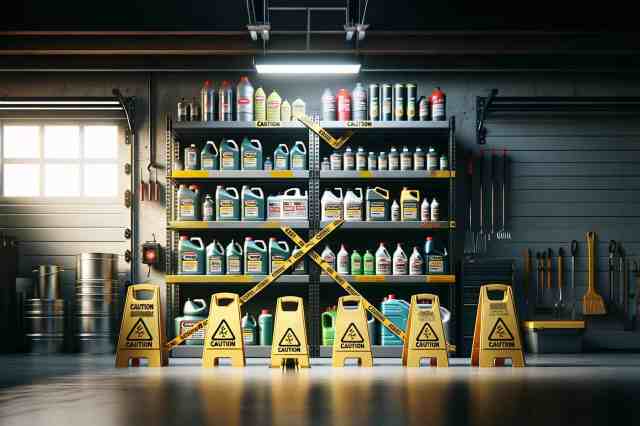The garage and shed provide convenient places to store items and equipment you use in and around the home. From tools and outdoor implements to powerful cleaning chemicals, the shelves of a garage tend to accumulate a wide variety of items. Even a well-organized garage can be a dangerous place due to the hazardous chemicals it contains. As you maintain an orderly garage or shed, follow recommendations for storage, use, and disposal of these products. Proper maintenance of hazardous chemicals helps make the garage and the environment safer places.
A wide variety of chemicals are common to a garage or shed. Anyone who maintains a yard or a garden will probably store fertilizer and herbicides in this location. These products can be toxic to humans and animals. Other typical products that sit on garage and shed shelves include paint, solvents, and gasoline. These products are flammable, so they require careful storage to prevent fire risks. For safety, keep these products in their original containers away from any sources of flame. Store oily rags carefully to prevent fire. A sealed metal container is the safest place to keep oily rags. Other automotive products, such as antifreeze, windshield washer fluid, and brake fluid, also contain dangerous chemicals and should be stored carefully.
The safest way to maintain chemicals in the garage is to only purchase what you will be able to use up. This will eliminate the need for disposing of hazardous chemicals. If you can’t use a product before it becomes unusable, consider giving it to someone else who can use it. Some municipalities organize donation centers to enable residents to donate hazardous products they don’t need. If you do need to throw away products that contain chemicals, always follow local ordinances for safe disposal. Cities often provide collection points for citizens to drop off their hazardous products for safe disposal.
- Portable Generator Hazards (PDF): Some people utilize a portable generator to heat a garage or shed. While portable generators can be useful for heating an area, they can produce dangerous levels of carbon monoxide. Safety demands using a portable generator outside to avoid the risk of carbon monoxide poisoning.
- Carbon Monoxide: Know the Hazards: To avoid lethal carbon monoxide exposure, never operate a generator, grill, or device with a gasoline-powered engine in a garage or shed. A fireplace located in these areas must have proper venting to be safe.
- Household Hazardous Waste Management: When maintaining an orderly garage or shed, keeping track of the hazardous chemicals is important. Purchasing only the chemicals needed will help minimize the amount of hazards. When it’s time to discard products, follow local ordinances.
- Home Hazard Hunt (PDF): When storing gasoline in the garage or shed, use an approved container only. Keep the fuel locked up to control access to it. For safety, store only a minimal amount of fuel.
- Keeping Kids Safe and Healthy in the Yard (PDF): Improper storage of chemicals can result in dangerous spills and leaks in the garage. Always keep chemicals in original containers to ensure that proper instructions and documentation are present with the products.
- Eliminating Household Hazardous Waste (PDF): Hazardous materials have specific signal words on labels to warn consumers. Words such as “flammable/combustible,” “explosive/reactive,” and “corrosive/caustic” indicate hazardous chemicals in a product.
- What Is Considered Hazardous Waste? Homeowners often store hazardous products in the garage or shed. Many products used around the house, such as caulk, weed killers, and solvents, require disposal methods that prevent environmental contamination.
- Poison Prevention: Keeping Your Family Safe: Keep children and pets safe with proper storage of products in the garage and the shed. Keep all products such as gas, motor oil, antifreeze, and rat poison in inaccessible places to prevent access.
- Dangerous Substances Lurking in Your Garage: Windshield wiper fluid contains a potentially lethal type of alcohol called methanol. Ingesting methanol could lead to blindness or death.
- Antifreeze and Windshield Wiper Fluid: Antifreeze contains ethylene glycol, which could lead to kidney failure with ingestion. Other typical garage items, such as de-icing products, may also contain ethylene glycol.
- Liquid Fuels: Safe Handling and Storage (PDF): Storing fuel requires care to prevent spills and leaks. Because fuel is flammable, a spill could cause a fire hazard. Proper labeling and color-coding will show the contents of a container.
- Consumer Tips for the Safe Management of Gasoline (PDF): Purchase only the gasoline you need, and use it within six months of purchase. Gas older than six months may become stale and unusable. Local municipalities usually offer hazardous waste collection points for consumers to dispose of products such as gas and other household chemicals.


